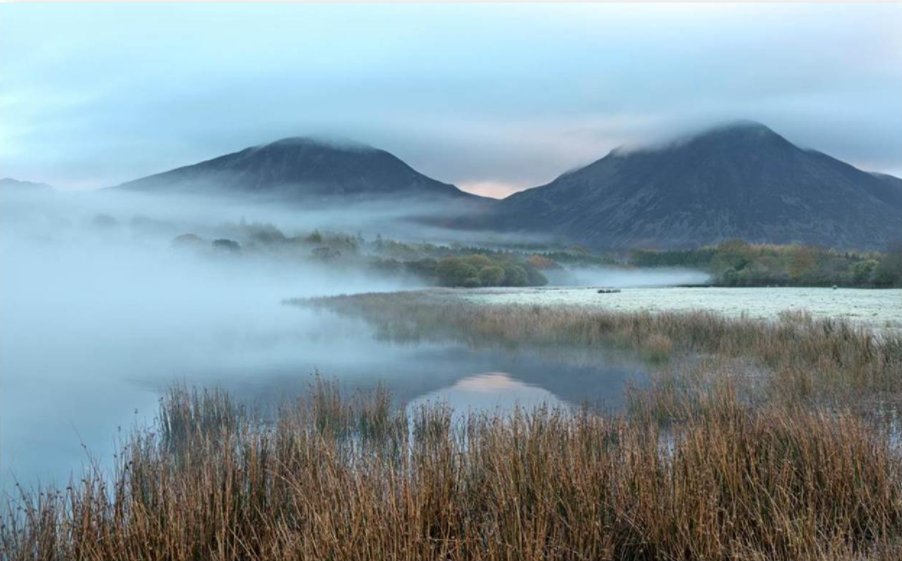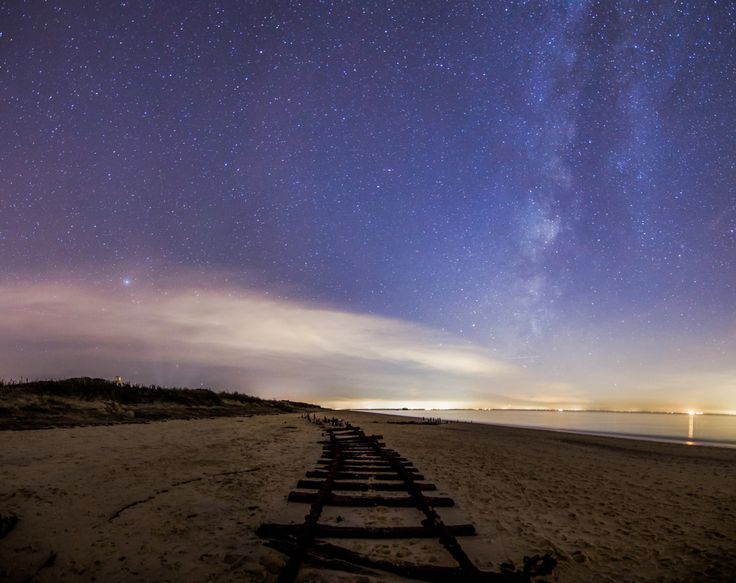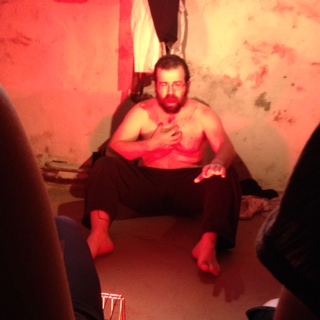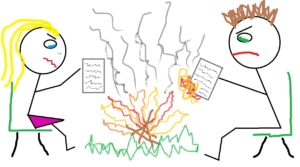I’m about to fly out to a place that filled me with awe before, both as a teenager and as a parent. So I’ve been thinking a lot about that mix of wonder and apprehension that you only feel when you face something that’s exponentially vaster and less comprehensible than the realities you struggle to manage every day.
As much as I’ve poked fun at friends this year that “Your sky is not falling Chicken Little,” it seems undeniable that we’re in the most unsettled time since the early Seventies when I first took this trip. So once again I’ve been thinking about antidotes like awe (and its sidekicks beauty and timelessness). As the following observations attest, you don’t necessarily need a plane to get there.
Awe Can Come From the Sounds of the Words

Robert MacFarlane is a naturalist and the author of a new children’s book called The Lost Words.
The book is his and illustrator Jackie Morris’ response to a controversy that, at first, sounds peculiarly British. In 2007, the kid’s version of the Oxford English Dictionary announced that it was adding words like “broadband” to its new edition while removing a host of other words that it found to be “less in use.” Many of those words—including acorn, blackberry and bluebell—put names to things that are experienced in the natural world. Did their removal from the dictionary signal a deeper loss about what we know and don’t know?
Philosopher A.J. Ayres has argued that without a word for something, you are unable to conceive of it. Your imagination, your ability to conceptualize, and your vocabulary are closely intertwined. As a word like “acorn” departs the lexicon, it becomes harder for you to imagine that nut which falls out of oak trees to the delight of squirrels and other managers of their winter stores. Surely, the dictionary’s culling would contribute to these words’ disuse and eventual oblivion.
In the controversy that followed, MacFarlane, Morris and others wrote an open letter to the dictionary’s editors that stated in part:
“There is a shocking, proven connection between the decline in natural play and the decline in children’s wellbeing.”
The editorial changes marked a alarming shift from the natural playground outside to the screen-centered world inside. To repair some of the broken connections, MacFarlane and Morris decided to collaborate on The Lost Words, each one of which had been removed from the dictionary.
With gorgeous illustrations and poems that are meant to be read by children or to them out loud, The Lost Words is intended to operate like a “spell”—as in leaving you spellbound or in awe of a word and where your imagination takes it.
These are some of MacFarlane’s poetic conjurings around the lost word “otter”:
Otter enters river without falter—what a supple slider out of holt and into water.
This shape-shifter’s a sheer breath-taker, a sure heart-stopper—but you’ll only ever spot a shadow-flutter, bubble-skein and never (almost never) actual otter….
In one interview, MacFarlane said:
We wanted to make a spell-book in two senses—in that children spelt these words but that there was also this great sense of enchantment; that old magic of speaking things aloud.
MacFarlane is often asked whether he is hopeful about the future. “The bigger picture is dismal,” he says, mentioning plastic pollution, climate change and extreme weather events. But he’s also concerned about feeling paralyzed in the face of it.
Small acts of care are crucial—grass-roots charities, individuals, books, words, [all] are doing magic work—so to say there’s no point is an abandonment of everything. Hope is a greater agent for change than despair.
You can follow his hopeful words on Twitter too @RobGMacFarlane
Great Teachers Share Their Awe
The shortest path to continuous learning comes from cultivating the desire to be surprised and amazed. The best teachers have this desire, and their life’s work is sharing their intoxication with others who want to have it too. For them, it’s an essential part of completing who you are.
A teacher can stimulate a compulsive kind of curiosity by recounting how a book, an experiment, a theory or an equation is still exciting to him or continues to affect her. “Thrilling.” “Gorgeous.” “Amazing.” “It can still send shivers down my spine.” Students can always follow scents of engagement like this because they can feel how they bring their teacher to life.
Why math, history, chemistry or English actually matter requires witnesses who have already been convinced and can share their belief. For teachers like this, the goal is not to transfer content into rows of empty boxes but to foster “a quality of mind” that inspires students to pursue their own questions while showing them how to satisfy their thirst for knowledge. It’s releasing the intrinsic sense of wonder in every learner instead diverting it into the extrinsic search for grades or the approval of others.
On the most basic level, infectious curiosity becomes a part of every learner’s agency. You complete yourself by your continuing willingness to be surprised and amazed.
To be awestruck.
Awe Follows Invitations to Get Lost in Something Bigger Than Yourself
 I recommend Casper Henderson’s A New Map of Wonders: A Journey in Search of Modern Marvels. It’s a rambling, lively and insightful discourse on the wonders that are all around us.
I recommend Casper Henderson’s A New Map of Wonders: A Journey in Search of Modern Marvels. It’s a rambling, lively and insightful discourse on the wonders that are all around us.
Like MacFarlane (another Brit), Henderson is careful with his words. “I prefer the term ‘wonder’ to ‘awe,’ he writes in a short essay about his new book in The Guardian:
For me, awe, even in its everyday clothes, is redolent of something that almost overwhelms us. Wonder, by contrast, is a state in which we remain in possession of our intellectual faculties as well as feel emotionally elevated. It has much in common with awe, but it also overlaps with curiosity. ‘When experiencing wonder,’ writes the scholar Matthew Bevis, ‘it feels as if we know something without quite being sure of what we know.’
Wonder is a state of deep attention in which we feel good and think clearly, and connect to phenomena beyond ourselves.
For me, whether you’re mindful or just about to lose it, what’s interesting about these phenomena is not just the mental focus they invite but also the unconstrained emotions they unleash.
For example, when considering rainbows, full-moons and meteor showers, Henderson notes how little the scientific explanations for these occurrences interrupt our experience of their majesty. Whatever our minds tell us, we are still delighted, amazed and almost lost to reverie when we see them.
There is also tremendous emotional gravity around our knowledge that world leaders in America, Russia and even North Korea have the power to launch a nuclear attack. Musing about a president’s access to the nuclear codes, Henderson manages to co-mingle our consideration of this awesome destructive power in his hands with its tragic and very human consequences by citing a jaw-dropping proposal that was made early in the Cold War:
[I]nstead of having launch codes in an attaché case carried by a young officer constantly at the President’s side, the codes [could] be surgically implanted in a capsule beneath the officer’s heart. Then if the President decided that the murder of tens of millions of people was necessary, he would himself have to access the codes by using a butcher’s knife to gouge out the young man’s heart.
For me, anyway, the wonders (like this) that Henderson describes are always on the cusp of lapsing into deep and uncontrollable awe. While becoming more mindful of the wonders around you may be exactly what you need to counter your screens’ addictive attractions, what makes his book so fascinating is its many invitations to get lost in contemplations that are so much bigger than yourself.
The Awesome Edge
Some really interesting things can happen when you leave the familiar behind and inhabit—if only in your mind for a limited time—what lies beyond it.
Victor Turner called this a liminal space, where the reality between the familiar and the unfamiliar tend to blur. From looking at rites of passage or transition rituals in many cultures—such as transforming a boy into man—Turner believed that when you are at the tipping point between one state and another, the dividing line between your individuality and a wider sense of shared meaning gets blurred. You are not only a boy, but also a vital part of a tribe. Not one organism, but united with the entire natural world.
It’s very trippy stuff, but Turner also argues that liminal spaces provide access to thoughts and emotions that can’t be accessed in any other way.

I had one of those experiences several years ago, when I left my freshman year in college for bootcamp in the Coast Guard. One of the short stories in my book describes the edge of my known world this way:
The Coast Guard’s training center juts into the Atlantic churn at the tip of New Jersey, and its southwest watch station sits on a ghostly beachhead whose brow meets the whitecaps when the moon is out. The watcher’s charge is to look out for anyone who is trying to infiltrate our clambake (or escape from it) when a gate of sorts opens between the fence that extends to the high water mark and the retreating tide.
During my duties at this station during “the mid-watch” from 2-6 a.m. one February morning, I could see:
the stern markers of passing trawlers, somebody on watch there too. There were buoys in the straits, candles that I’d learn to keep to my right when following a channel. Under the torn up dark there were even planes on their way to Newark or Philly, their taillights dipping beneath the clouds and their pilots looking down to see where the water turned to land.
I was sick, sleep deprived, feeling sorry for myself, 19 and wondering what I had to hold onto. I knew where I was coming from, but not what I wanted to go back to.
You have to go out—sometimes very far out—and experience something like awe before you can come back in to reassemble the pieces. It may be the only way to refresh what’s really important.
Place Settings for Awe

Shortly after this post, I am flying out for a week in Rome.
I’ve experienced place-induced awe more than once when travelling.
Looking out over the rooftops in East Jerusalem, descending the slick rocks behind a waterfall in Venezuela, drowning in the flower clogged prairie of western Colorado in late June. I’ve also experienced it in Rome. Like Jerusalem, it’s a place where one layer of history is piled on top of another while at the same time it is intensely lived in—through daily use—by everyone who’s there now.
Because they are living so hard and so well, no one in Rome is interested in turning the city into a theme park, so the immensity of time and lived experience is almost everywhere.
I can’t believe how much I’m looking forward to the pageant of it, the food, and the vistas that keep opening up and down its seven famous hills. When the jet lag has been slept away, or maybe while I’m still in its hazy focus, I might even feel its special kind of awe again.
Note to readers: in a slightly different form, this content was included in my December 10, 2017 Newsletter, the first of what turned into three posts about awe.



